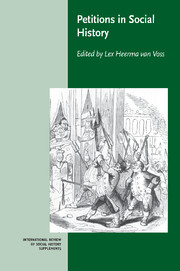Book contents
- Frontmatter
- Contents
- NOTES ON CONTRIBUTORS
- Introduction
- Voices from Among the “Silent Masses”: Humble Petitions and Social Conflicts in Early Modern Central Europe
- Supplications between Politics and Justice: The Northern and Central Italian States in the Early Modern Age
- The Power of Petitions: Women and the New Hampshire Provincial Government, 1695–1700
- Officially Solicited Petitions: The Cahiers de Doléances as a Historical Source
- Revolt, Testimony, Petition: Artisanal Protests in Colonial Andhra
- Deference and Defiance: The Changing Nature of Petitioning in British Naval Dockyards
- Petitions and the Social Context of Political Mobilization in the Revolution of 1848/49: A Microhistorical Actor-Centered Network Analysis
- The Image of Jews in Byelorussia: Petitions as a Source for Popular Consciousness in the Early Twentieth Century
- “Begging the Sages of the Party-State”: Citizenship and Government in Transition in Nationalist China, 1927–1937
- Private Matters: Family and Race and the Post-World-War-II Translation of “American”
Deference and Defiance: The Changing Nature of Petitioning in British Naval Dockyards
Published online by Cambridge University Press: 04 August 2010
- Frontmatter
- Contents
- NOTES ON CONTRIBUTORS
- Introduction
- Voices from Among the “Silent Masses”: Humble Petitions and Social Conflicts in Early Modern Central Europe
- Supplications between Politics and Justice: The Northern and Central Italian States in the Early Modern Age
- The Power of Petitions: Women and the New Hampshire Provincial Government, 1695–1700
- Officially Solicited Petitions: The Cahiers de Doléances as a Historical Source
- Revolt, Testimony, Petition: Artisanal Protests in Colonial Andhra
- Deference and Defiance: The Changing Nature of Petitioning in British Naval Dockyards
- Petitions and the Social Context of Political Mobilization in the Revolution of 1848/49: A Microhistorical Actor-Centered Network Analysis
- The Image of Jews in Byelorussia: Petitions as a Source for Popular Consciousness in the Early Twentieth Century
- “Begging the Sages of the Party-State”: Citizenship and Government in Transition in Nationalist China, 1927–1937
- Private Matters: Family and Race and the Post-World-War-II Translation of “American”
Summary
INTRODUCTION
Petitioning as a method of expressing grievances in British history was not peculiar to any particular set of individuals, but was widely used by all sections of society for a range of issues. Given its origins, however, it became ritualized as the means of labour negotiation for workers who were employed by the state, and, by the nineteenth century, by municipal authorities. This was before the institutionalization of trade unions and their recognition as representative agencies for industrial bargaining. One of these groups of workers in the state sector were naval dockyard employees, engaged in the construction, repair, and maintenance of British naval ships. For these workers, the nature of labour relations, and the importance of petitioning as an instrument of negotiation between employees and employer, was both complex and dynamic.
It was the state as employer which characterized the context of work in the Royal Dockyards. Although it is the case that the yards never had a monopoly on the building of the nation's ships – commissioning in private yards was always an element, particularly in times of impending conflict – it was the unique nature of the employment relationship in these yards which set them aside from private shipbuilding concerns and gave the petitioning system a particular set of meanings. This system, tying workers into “the service of the state”, contributed, therefore, to forms of bargaining which were peculiar to national and local government employment.
- Type
- Chapter
- Information
- Petitions in Social History , pp. 131 - 150Publisher: Cambridge University PressPrint publication year: 2002
- 12
- Cited by



